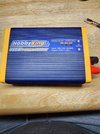Maybe a long shot...but I have this inverter that I'd like to function. I bought it used, and ended up getting a refund for it since it doesn't work--so I'm not out anything if I ruin it trying to fix it. 
It's a GoWise Power PS1002. When you turn it on it beeps intermittently, and the "protect" LED is lit while beeping. Watch short vid:
At no point does it output 120V AC. I looked up the owner's manual, and it indicates an intermittent beep is the low-voltage cutoff, supposed to be at 10.6V. An over-voltage (>16V) would be a continuous beep. As you can see in the vid, input power is good. I've taken it apart far enough to look at internal connections and fuses, and all look good. (connections to the board are potted so I can't see them, but nothing is disturbed)
The only sorta-similar situation I've found in my searching, is a YouTube guy who fixed his inverter by replacing the mosfets. If that is the fault on this one, I can handle that amount of work--but I'm hoping there's a way to test, or confirm those are the problem before starting on anything.
Anyone have any ideas, or methods of testing, or any other input?
It's a GoWise Power PS1002. When you turn it on it beeps intermittently, and the "protect" LED is lit while beeping. Watch short vid:
At no point does it output 120V AC. I looked up the owner's manual, and it indicates an intermittent beep is the low-voltage cutoff, supposed to be at 10.6V. An over-voltage (>16V) would be a continuous beep. As you can see in the vid, input power is good. I've taken it apart far enough to look at internal connections and fuses, and all look good. (connections to the board are potted so I can't see them, but nothing is disturbed)
The only sorta-similar situation I've found in my searching, is a YouTube guy who fixed his inverter by replacing the mosfets. If that is the fault on this one, I can handle that amount of work--but I'm hoping there's a way to test, or confirm those are the problem before starting on anything.
Anyone have any ideas, or methods of testing, or any other input?

